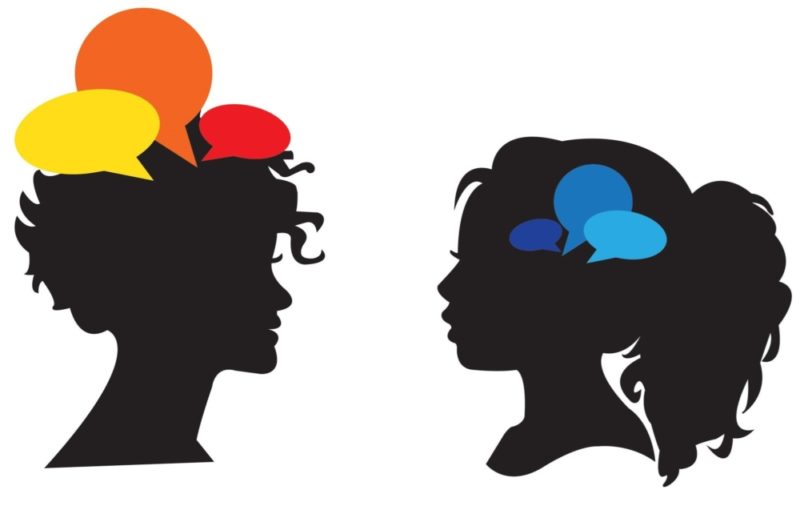After passing the next psychological test, a person discovers that he is an extrovert, but who it is is not clear. Whether it is good or bad, whether something needs to be fixed or everything is going as it should - these questions are haunting and require an immediate response. Let's try to understand together the theory of psychological types.
Material Content:
Extrovert - who is it, the concept of extraversion
Extraversion is a psychological term that describes a particular type of human personality. Its creator is Carl Gustav Jung, a Swiss psychiatrist, the founder of analytical psychology. His ideas were further developed in the work of other researchers. Of greatest interest is the socionics of Ausra Augustinavichiute.
The opposite of extraversion is introversion. To describe these concepts in an accessible language, Carl Jung coined the term “libido,” which means the life energy of an individual.
Extraversion is manifested in the direction of movement of the libido to external objects of the surrounding reality.
The task of an extrovert is to spend energy on interacting with the outside world. In return, he receives the necessary charge of emotions and aspirations, which helps him to stay in tone, act and develop further.
The behavior of extroverts has characteristic features:
- prefer elegance, impracticality in clothing, pay tribute to fashion at the expense of convenience;
- love energetic, lively music;
- pay attention to decorative details in the design of housing and office;
- encourage teamwork and friendship.
In fact, there are three psychological types - an introvert, an extrovert, an ambivert. Pure extraversion is a pathology; introvert features are necessarily present in a person. Ambibert is a type of personality that is in the middle between two opposites. It is important for every person to understand their nature and true desires, because following inborn inclinations leads to harmony with oneself and the world.
Behavior features
Extraversion is a special attitude of the human psyche. A popular mistake is the opinion that extroverts are open, sociable and noisy guys. This is not so; logic and ethics are responsible for sociability and non-sociability. Extraversion also affects sociability, but this indicator is not the main one.
The installation of the psyche is a way of knowing your personality and surrounding reality. According to the concept of Jung’s psychological types, extroversion differs in the direction of interests outside, from subject to object, when all attention is focused on the outside world.
An extrovert is a person who is interested in:
- people
- events
- things;
- travel, etc.
Extroverts most of the time tend to waste their energy to get new impressions, therefore they are constantly in interaction with objects of the outside world.
It can be not only people, if there is not enough live communication, television and the Internet make up for it. Extroverts are characterized by a superficial study of information, the desire to cover as many directions as possible.
Other characteristic signs:
- attract the attention of people around;
- the number of friends is usually from 10 to several hundred people;
- faster pace of speech and louder voice;
- love to gesticulate during communication, dynamic and mobile;
- quickly, often recklessly, express their opinion.
It can not be said about a person that he is a pure extrovert and is 100% consistent with this type of installation. Each formed personality to a certain extent is an extrovert and an introvert, who it is, in fact, can only be understood with a closer acquaintance.
Advice on raising an extrovert child
A person in a certain period of time can live in different temperaments, but he has natural inclinations. The inborn type of a child can be calculated from 1.5–2 years. The correct system of education in accordance with the innate type of personality allows you to grow a harmoniously developed personality. Since if you develop strengths of character, then weaknesses begin to be tightened. Each person is ingenious if from childhood to develop channels through which he best assimilates information.
It is necessary to teach the child an extrovert to learn knowledge from books, develop the body and monitor their health. It is important to lay down the ethical principles of existence in society, the ability to establish and maintain relationships with people. You need to teach love, empathy, empathy, respect.
The main socionic types
The use of tests does not always make it possible to correctly determine the socionic type of a person. Leading in the analysis are external signs, behavior, clothing style and speaking. A total of 16 types are distinguished, 8 of which correspond to different manifestations of extraversion in combination with the predominant and additional personality function.
Description of extrovert types and related characteristics:
- Logical-sensory extrovert (FEL). Perfectly manages multiple operations at the same time without compromising the result.
- Logical and intuitive (LIE). He is capable of active action; he does not tend to doubt and give up in a difficult situation.
- Ethical Sensory Extrovert (ESE). Throughout his life he is optimistic. The business in which he is interested is fulfilling with enthusiasm.
- Ethical and Intuitive (EIE). Capable of mentoring, educational work.He likes to play, at different stages of personality development, a tendency to play or mentor may be more pronounced.
- Sensory Logical (SLE). Successful in the struggle with a limited resource of time and money. Able to analyze and skillfully use all the features. Often does not take into account the feelings of other people, seeking to achieve the goal.
- Sensory-ethical extrovert (SEE). Able to find balance in an unstable situation, able to profit.
- Intuitive Logical (ILE). Characterized by a constant thirst for new information. A person is disorganized in everyday life, and often searches for lost things.
- Intuitive Ethical (IEE). He prefers to be away from the case, but soberly assesses the situation and can give the right advice based on the facts.
Together with introverts, which are also characterized by 8 types with a different orientation, extroverts form a single "socion". Its stability determines the informational interaction of individuals with unique abilities to perceive and comprehend the world.
How to find an approach to such people
For effective interaction with a typical extrovert, you need to become a good conversationalist for him. If the meaning of human life is communication, he wants to enjoy the conversation. He should only talk more - talk about himself, his joys and problems, achievements and failures.
An extrovert needs an attentive listener who will sincerely sympathize, agree, and compliment. The emotional type will seek approval of actions from the interlocutor, it is important for him that his emotions resonated with other people. Those who want to please such a person need to share with him a joyful mood and optimistic mood.
Extreme manifestations of personality type
An example of research in this area is the work of a British scientific psychologist: Hans Jürgen Eisenck rethought Jung's concept, and created a “three-phase theory of the onset of neurosis.” Thanks to his work, a method of psychotherapeutic personality correction was developed.
According to the psychiatric typology of personality, an extrovert is a man limp, dependent on other people's opinions. He is optional and speaks faster than he thinks. The information given may be of poor quality. An extrovert who talks a lot about himself and thinks little can cause serious harm to his reputation and life, because any information can be used to the detriment of a person.
But lack of will and dependence on external influence - these are extreme degrees of manifestation of extraversion, which need correction.
Extroverts are different - impulsive or calm, overly sociable or restrained. Some perfectly control the feelings, others obey their instincts and other people's whims. It is impossible to generalize the characteristics of a person only in a positive or negative way, it is important to understand how best to find an approach to him.
Extroverts and relationships
An energetic extrovert will look for a society of a person with an active lifestyle, passive, slow and lazy people are unpleasant to him. To like an extrovert, you need to be sincerely interested in his hobbies, interests. He will tell a lot about himself, he will “look” at the interlocutor, as if in a mirror, trying to see his best features there. It is important for him to hear from others how important he is, dear, significant in their eyes.
Building a good relationship with an extrovert is easy if you don’t try to change it. Such a person can have its weaknesses - haste in conclusions, incontinence in words, superficial assimilation of important information. But the main thing is the desire for communication, a friendly attitude towards people, interaction with whom is as important as air and water.
The strengths of the extrovert are the activity and optimism with which it “charges” everyone around. Such a person often seeks to occupy a leadership position, to be a leader in relationships.He likes to transfer analytical work and planning to his subordinates, close people. But his positive desire to change the world for the better is worthy of respect and help.
Extroversion and introversion to a greater or lesser extent live in each person. You need to respect the sociable and friendly part of his nature, which does not like loneliness.
It can be concluded that extroverts can be great friends, good leaders, interesting and nice people to chat with. They charge others with their optimism, inspire people to believe in success.


















